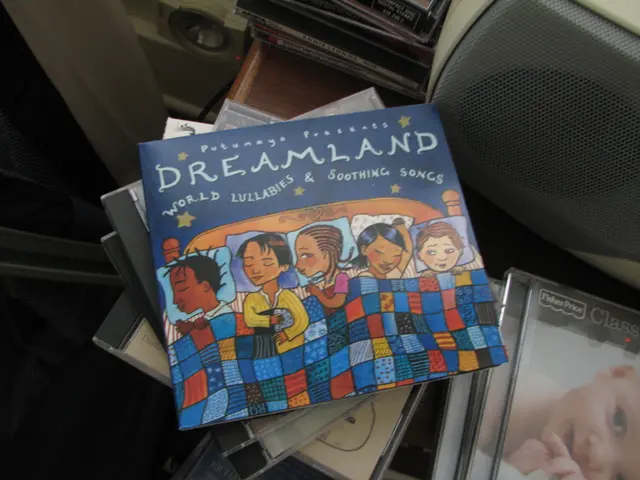Research and Development (R&D) in the fields of arts, humanities, and social sciences within the corporate sector.
The UK government has made a strong commitment to increasing investment in research and development (R&D), with a target of investing 2.4% of GDP in R&D by 2027. This move aims to enhance the UK's innovation performance and economic growth.
A policy briefing, authored by Professor Hasan Bakhshi MBE, Jonathan Breckon, and Ruth Puttick, examines this issue in depth. The briefing focuses on international trade in the UK creative industries and the significance of understanding and measuring R&D in the services sector, particularly those with origins in arts, humanities, and social sciences (AHSS) disciplines.
The briefing is based on a research study that addresses the lack of recognition and support for R&D in the AHSS in a business setting. It highlights how R&D in AHSS plays a significant role in business settings and the UK's innovation performance and economic growth by broadening the scope of innovation beyond traditional science and technology sectors.
In business settings, R&D in AHSS supports innovation by generating new ideas, products, services, and processes that are culturally and socially relevant. These fields help businesses better understand consumer behavior, cultural trends, digital innovation, and social dynamics, which can lead to unique competitive advantages and enhanced productivity.
Within the UK economy, arts and humanities sectors account for a substantial part (9.3%) and have historically driven growth. However, these sectors have faced recent declines, emphasising the need for strategic R&D investment to revive innovation and productivity.
The UK government views R&D across all knowledge domains, including arts and culture, as warranting conceptual frameworks aligned with international standards like the Frascati Manual. Developing agreed definitions and case studies for arts and cultural R&D would enhance measurement, policy assessment, and demonstrate its social rate of return.
Innovation that includes cultural and social knowledge contributes not only to economic growth but also to regional development and sustainability, priorities for UK policy. Expanding R&D engagement beyond a few high-tech firms and metropolitan areas is critical to address regional disparities and promote inclusive growth.
The arts, humanities, and social sciences increase the diversity of innovation inputs, complementing science and technology fields and enhancing the UK’s overall innovation ecosystem and long-term economic resilience.
The policy briefing sets out areas for possible policy action in Skills, Jobs, and Education in the UK. It also outlines recommendations for transitioning to sustainable production in the UK theatre sector. The brief can be referenced as Bakhshi, H., Breckon, J. and Puttick, R (2021) Business R&D in the arts, humanities and social sciences.
The policy brief uses census data to provide a comprehensive analysis of audiences and workforce in arts, culture, and heritage. It is structured around ten headline findings that tell a story about the broad nature of R&D in the arts, humanities, and social sciences, the more selective interpretation of the definition of R&D in UK policymaking, the limits this imposes on accurate data collection, the implications for business understanding, and the opportunities for more effective research and innovation policymaking.
References:
[1] Bakhshi, H., Breckon, J. and Puttick, R (2021) Business R&D in the arts, humanities and social sciences. London: Creative Industries Policy and Evidence Centre and Nesta. Available from: https://our website/policy-briefings/business-r-d-in-the-arts-humanities-and-social-sciences
[2] Bakhshi, H. and Puttick, R (2020) The arts, humanities and social sciences in the UK creative economy. London: Creative Industries Policy and Evidence Centre and Nesta. Available from: https://our website/policy-briefings/the-arts-humanities-and-social-sciences-in-the-uk-creative-economy
[3] Breckon, J., Puttick, R. and Bakhshi, H. (2020) The value of the arts, humanities and social sciences in the UK creative economy. London: Creative Industries Policy and Evidence Centre and Nesta. Available from: https://our website/policy-briefings/the-value-of-the-arts-humanities-and-social-sciences-in-the-uk-creative-economy
[4] Department for Digital, Culture, Media and Sport (2023) Creative Industries Economic Estimates. Available from: https://www.gov.uk/government/publications/creative-industries-economic-estimates/creative-industries-economic-estimates
- The UK government plans to invest 2.4% of GDP in research and development (R&D) by 2027, a move aimed at boosting innovation and economic growth.
- A policy briefing authored by Professor Hasan Bakhshi MBE, Jonathan Breckon, and Ruth Puttick scrutinizes the investment in R&D, particularly in the creative industries and arts, humanities, and social sciences (AHSS) disciplines.
- The policy briefing emphasizes the importance of R&D in the AHSS sector in business settings, as it generates culturally and socially relevant ideas, products, and processes, resulting in unique competitive advantages and increased productivity.
- Arts and humanities sectors in the UK economy account for a substantial part (9.3%) and have historically driven growth, highlighting the need for strategic R&D investment to reverse innovation and productivity declines.
- The UK government views R&D across all knowledge domains as vital, including arts and culture, and advocates for conceptual frameworks that align with international standards.
- Developing agreed definitions and case studies for arts and cultural R&D would enhance measurement, policy assessment, and demonstrate its social rate of return.
- Innovation that includes cultural and social knowledge contributes not only to economic growth but also to regional development and sustainability, priorities for UK policy.
- The policy briefing outlines recommendations for transitioning to sustainable production in the UK theatre sector and areas for possible policy action in Skills, Jobs, and Education.
- The briefing uses census data to provide a comprehensive analysis of audiences and workforce in arts, culture, and heritage, and is structured around ten headline findings that address the limitations of the current definition of R&D in UK policymaking and its implications for business understanding.
- The briefing can be referenced as Bakhshi, H., Breckon, J. and Puttick, R (2021) Business R&D in the arts, humanities and social sciences.
- The arts, humanities, and social sciences increase the diversity of innovation inputs, complementing science and technology fields and enhancing the UK’s overall innovation ecosystem and long-term economic resilience.
- References for further reading on this topic can be found in the resources provided in the policy briefing, including links to related policy briefings and government publications on the creative industries and economic estimates.







